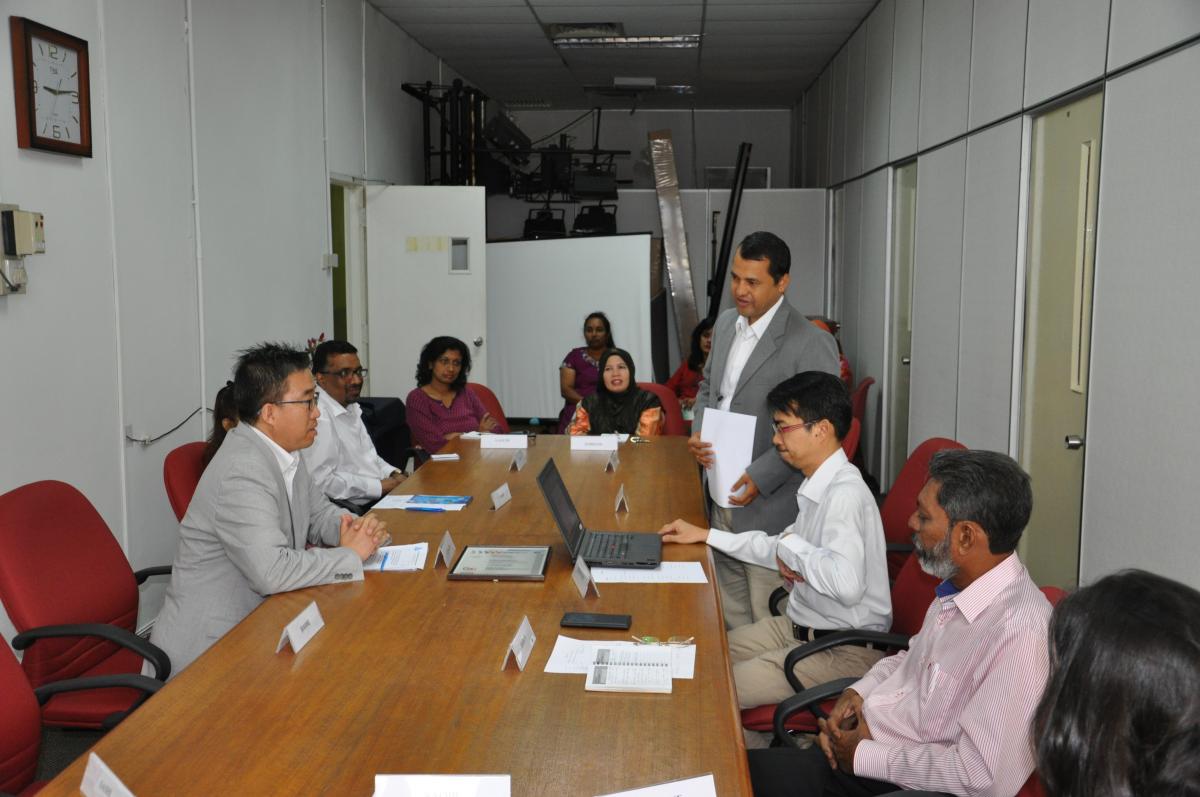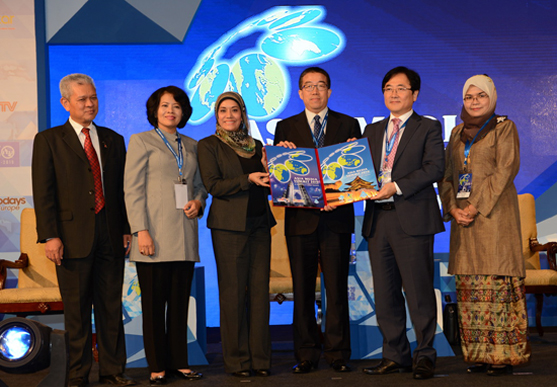AIBD is to be recertified this year for ISO 9001:2008 and ISAS BCP 9001:2010. The re-certification external audit was conducted at AIBD from 27 to 28 August 2015. Mr Eddie Fuad from SGS Sdn. Bhd. Systems & Services conducted the audit.
AIBD is to be recertified this year for ISO 9001:2008 and ISAS BCP 9001:2010. The re-certification external audit was conducted at AIBD from 27 to 28 August 2015. Mr Eddie Fuad from SGS Sdn. Bhd. Systems & Services conducted the audit.
Mr Chang Jin, Director AIBD while welcoming the Auditor explained how ISO certification is important for the AIBD to maintain its credibility. He further added that the ISO systems have made working procedures easier. Even though he is new to the organisation, the ISO documentations have helped him adapt to the office functions quickly.
Mr Fuad conducted a process-based audit focusing on significant aspects of risks and objectives as required by the standard.
The audit method consisted of interviews, observation of activities and review of documents and records. Mr Faud audited staff in charge of various procedures individually included. The departments audited include Programme, IT, Administration and the Directorate. Risk management, stakeholders' satisfaction, staff satisfaction, analysis of data and objectives from consolidated report, objectives, internal audit and continuous improvement action, etc. were the different procedures audited.
The auditor concluded that the AIBD has established and maintained its management system in line with the requirements of the ISO standards and demonstrated the ability to achieve agreed results during 2012 to 2015.
It is worth mentioning here that AIBD was awarded the Quality Management Certificate, ISO 9001:2003 and ISAS BC 9001:2008 in 2009 as a reflection of its competence and credibility towards pursuing initiatives for media development in the Asia-Pacific. Certificate was issued by the Geneva-based Media and Society Foundation (MSF), the certificate remained valid till June 15, 2012 and covered activities such as training, consultancy, publication, content production, and conference and workshop organisation. It was re-certified as ISO 9001:2008 and ISAS BCP 9001:2010 on 15 October 2012. After the re-certification new areas including electronic media, press and internet content production got added.
In 2012 certificate was issued by SGS Sdn. Bhd. Systems & Services Certification, Malaysia which is affiliated with International Standards Accreditation Services (ISAS).

AIBD hopes to be recertified for another three years, when the current term comes to an end in October 2015.
ISO re – certification audit for AIBD
AIBD is to be recertified this year for ISO 9001:2008 and ISAS BCP 9001:2010. The re-certification external audit was conducted at AIBD from 27 to 28 August 2015. Mr Eddie Fuad from SGS Sdn. Bhd. Systems & Services conducted the audit.
AIBD’s New Initiatives in 2015-16
The14th AIBD General Conference recently approved three AIBD projects that will beef up the capability of the Institute’s workforce, improve current services to members, and expand memberships to new media industries.
The first project is a new initiative called AIBD Annual Media Research (AAMR) that will provide basic data collection and preliminary analysis subject to further deliberation from resource persons and speakers during the Summit.
It seeks collaboration with some 24 training and research institutions of member countries as well as international partners.
AIBD Eyes More Quality In-Country Training Workshops
Mr Chang Jin, AIBD Director, says the Institute is eyeing more quality training and in-country workshops in its bid to offer better services to members and attract new members.
During the last 12 months, Director Chang Jin reported to the AIBD Executive Board that the Institute implemented 27 training activities benefitting close to 700 broadcasters from 46 countries and regions.
These activities covered various fields such as new media and social media, management, children/gender/youth, digitisation, production and training of trainers, among others.
China and Iran Host 2 Key AIBD Events
China and Iran have accepted to host two important AIBD activities taking place in 2016 and 2017.
The State Administration of Press, Publications, Radio, Film and TV, China (SAPPRFT) has tentatively decided to host the Asia Media Summit in 2017, likely to be held outside Beijing.
However, it will need final approval from China’s central government before preparations for the Summit can begin.
This will be the third time China will host the AMS, the first happened in Macau and the second in Beijing in 2010.
AIBD Supports More Women Participation in Media
UNESCO has urged broadcasters to put more focus on allowing greater women participation in media and on ensuring the safety of working journalists in Asia-Pacific.
A 2015 study by UNESCO, International Federation of Journalists and UN Woman shows that only 28% of women belong to the media workforce and much less at the decision-making level in the region.
On safety of journalists, UNESCO data indicates that a working journalist is killed every week and 90% of the crime is left unpunished.
AIBD’s Annual Performance Report
AIBD has successfully implemented its programme activities and initiatives during the last 12 months, notably the Asia Media Summit 2015 in Kuala Lumpur and the 27 training activities benefitting close to 700 broadcasters from 46 countries and regions in Asia-Pacific and beyond.
It has also pursued close collaboration with governments, international, regional and national broadcasting organisations, among them, the Tun Abdul Razak Broadcasting Information Institute of Malaysia (IPPTAR), Arab States Broadcasting Union (ASBU), Norwegian Broadcasting Corporation, ITU, ABU, EBU, CCTV and FES.
Catching Up with Trends and Changes in the Broadcast Landscape
Broadcast organisations need to catch up with trends in the fast-changing media landscape to be able to better serve its modern audiences, particularly young consumers of old and new media.
They must also pay special attention to their corporate social responsibility in educating their audiences, and promoting media ethics and media literacy in today’s digital world.
Beefing up AIBD Marketing Efforts
The AIBD Strategic Plan Team (SPT) wants institutions in Asia and beyond to know more about the Institute’s programmes and achievements as part of efforts to recruit new members and better serve its current members.
AIBD currently has 34 full members and 66 affiliate member organisations, representing 48 countries and regions.
The SPT has endorsed the Secretariat’s efforts, among others, to beef up dissemination of the AMS proceedings and achievements to its members and partners.
Dart’s 2015 Ochberg Fellowship
The Dart Centre Asia-Pacific is providing two expense-paid fellowships to Australian and regional mid-career journalists who want to develop knowledge Dart Centre for Journalism and Trauma of emotional trauma to improve coverage of violence and disaster.
Fellowships are open to media professionals from all modes of reporting with at least five years of journalism experience.
The Asia Pacific Fellows will join ten or more European, American and Latin American journalists at an intensive week-long program of seminars and discussions held at Columbia University in New York City.
Korea to host AMS 2016
Korea promises that the next Asia Media Summit to be held in Seoul from 24 - 26 May 2016 will be a fruitful, exciting and meaningful event.




